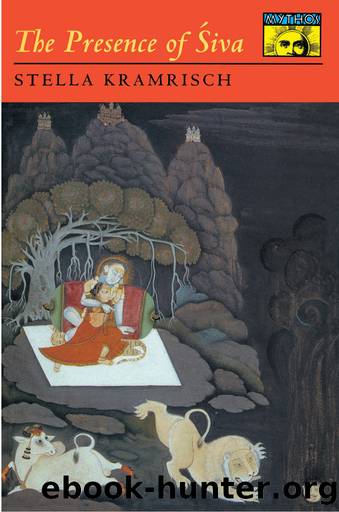The Presence of Siva by S. Kramrisch;

Author:S. Kramrisch;
Language: eng
Format: epub
Publisher: Princeton University Press
Published: 2021-01-13T00:00:00+00:00
2. THE SEVERED HEAD: THE CAUSE OF ITS FALL
The fifth head of BrahmÄ had to fall, for more than one reason. The SkÄnda PurÄna remembers the one fundamental, primordial cause. It says that formerly, in the very beginning of the Ká¹ta Yuga, the golden age, BrahmÄ was enamored of his youthful daughter and was about to cohabit with her. Seeing this, Åiva cut off with a sword the fifth head of BrahmÄ (SkP.2.3.2.3-4; cf. 3.1.40.5-16). The primal scene, at the beginning of days, is staged here in the costume of a later age, when the figure of the Father PrajÄpati had acquired the features of BrahmÄ, including the fifth head, the physiognomical projection skyward of his lust that had gone to his head. Rudra, in this setting, did not direct his arrow toward the sex of PrajÄpati. Instead, he wielded a sword by which he cut off the obnoxious head.4 But for the change in costume and iconography, the primordial scene has remained intact.
According to other accounts, the site of the decapitation of BrahmÄ was not the stark vastness of a nascent world but the sublime peak of Mount Meru, the cosmic mountain (KÅ«P.2.31.3). There, the great sages asked BrahmÄ which god was the imperishable, supreme reality. Deluded by Åivaâs mÄyÄ, BrahmÄ declared himself as the supreme reality (KÅ«P.2.31.4-6). Viá¹£á¹u made the same claim for himself (KÅ«P.2.31.8-10). The Vedas declared Åiva to be the ultimate reality in whom all beings reside, the highest reality that the yogis know, the Great Lord who makes the wheel of existence revolve, Sankara, the bringer of peace, MahÄdeva, the Great God, Puruá¹£a, the primal being, Rudra (KÅ«P.2.31.13-16). Hearing these words, BrahmÄ in his delusion laughed and asked: âHow is it that the Supreme Spirit, the BrahmÄn, free of all attachment, lustily sports with his wife and the very haughty Pramathas, the churn-spirits?â (KÅ«P.2.31.17-18; cf. ÅP.3.8.31-32; SkP.3.1.24.16).
BrahmÄ, in this contest of supremacy, assumed an aggressive stance against Åiva, who was not present in the assembly of the gods and sages on the peak of Mount Meru. It was under the spell of the mäyä of Lord Åiva that the two demiurges acted as they did. BrahmÄ inveighed against Åiva for the same reason thatâin the opinion of some of the godsâRudra had attacked PrajÄpati in the primordial scene. The intercourse of PrajÄpati and his daughter, however, had been a signal only that the wholeness of the absolute was being ruptured by the flow of its substance into creation. Subsequently, the meaning of the symbol sank into, and was submerged in, its sexual impact. It rose to BrahmÄâs uneasy and deluded mind when he attacked Åiva, the Great Yogi, apparently in the thrall of lust and thus disqualified from being supreme reality, free from all attachment.
The final word in the assembly of gods and sages was spoken by a formless one that had taken on a form, the sound AUM, the primordial sound, the praá¹ava, the source of all mantras (KÅ«P.2.31.19). Praá¹ava said, âNever does the Great Lord Rudra-Åiva take delight in any wife who would be separate from his own self.
Download
This site does not store any files on its server. We only index and link to content provided by other sites. Please contact the content providers to delete copyright contents if any and email us, we'll remove relevant links or contents immediately.
What Is the Gospel? (Foreword by D. A. Carson) by Greg Gilbert(951)
Daily Strength: Devotions for Bible Believing Study by Douglas Stauffer & Andrew Ray & Rick Quatro(854)
Christian Ethics by Wilkens Steve;(765)
The Practice Is the Path by Tias Little(757)
New Morning Mercies by Tripp Paul David(755)
Jesus in Me by Anne Graham Lotz(716)
Veritas: A Harvard Professor, a Con Man and the Gospel of Jesus's Wife by Ariel Sabar(693)
Cleaning Up Your Mental Mess by Dr. Caroline Leaf(673)
Greatest Mystery in the World by Og Mandino(608)
The Creative Call by Janice Elsheimer(530)
No More Christian Nice Guy by Paul Coughlin(528)
Our Appointment with Life by Thich Nhat Hanh(526)
2084 by John C. Lennox(508)
This One Wild and Precious Life by Sarah Wilson(495)
Monastic Archaeology by Unknown(494)
Jesus--Awesome Power, Awesome Love (Discover 4 Yourself® Inductive Bible Studies for Kids) by Kay Arthur(492)
The Duties of Parents by J.C. Ryle(468)
The Tale of the Tardy Oxcart (Swindoll Leadership Library) by Swindoll Charles R(446)
A Closer Talk with God: Scriptural Prayers for Women by Kim Trujillo(434)
